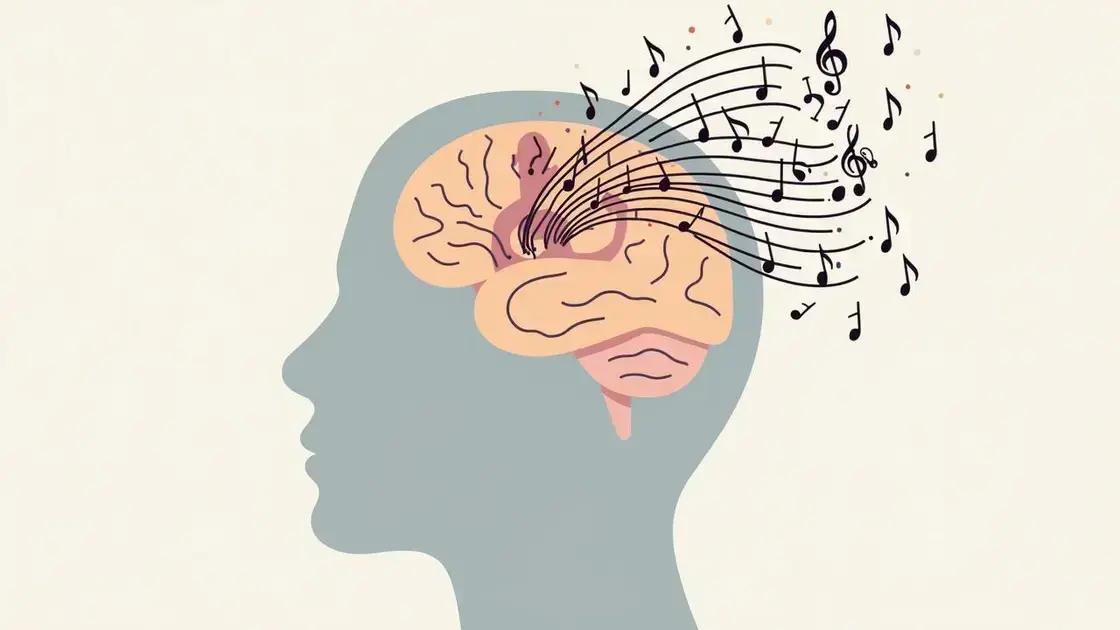Using music for stress reduction involves selecting calming genres like classical or ambient music, creating a personalized playlist, and utilizing mindfulness techniques to enhance relaxation and improve emotional well-being.
Using music for stress reduction is a powerful way to enhance well-being and promote relaxation. Studies have shown that listening to music can significantly lower levels of stress and anxiety, making it an effective tool for managing life’s pressures. In this article, we will examine the science behind music and stress relief, explore practical techniques for integrating music into your stress management routine, suggest music genres that are particularly soothing, and guide you in creating a personalized playlist designed to help you unwind and refresh your mind.
The Science Behind Music and Stress Relief

The connection between music and stress relief is backed by science. Numerous studies have shown that music can have a profound effect on our emotions and mental state. When we listen to music, our brain releases dopamine, a chemical that promotes feelings of happiness and pleasure. This chemical response contributes to reducing anxiety and stress.
How Music Affects the Brain
Our brains process music in various ways. Different elements of music, such as rhythm, melody, and harmony, can trigger reactions in our brain that influence our stress levels. For example, slow-tempo music can activate the parasympathetic nervous system, which encourages relaxation and lowers blood pressure.
Studies Supporting Music Therapy
Research has indicated that music therapy can effectively help individuals who experience stress-related issues. Therapists use music as a tool to address emotional challenges, improve mood, and enhance the overall quality of life. A study published in JAMA Internal Medicine found that listening to music during stressful events helped participants reduce their anxiety levels significantly.
Types of Music and Their Effects
Different types of music can evoke various emotional responses. Classical music, for instance, is often associated with relaxation, while faster-paced genres can energize the listener. Understanding the specific effects of different music styles can help individuals choose the right type of music for their stress relief needs.
Incorporating music into your daily routine can serve as a practical and enjoyable way to combat stress. By understanding the science behind the connection between music and stress relief, you can harness the power of music to enhance your well-being.
Techniques for Using Music to Reduce Stress

Using music effectively can play a significant role in reducing stress levels. Here are some practical techniques to consider:
Create a Calming Environment
Start by setting the right atmosphere. Find a quiet space where you can relax and enjoy the music without distractions. Dim the lights and consider incorporating elements like comfortable seating or scented candles to enhance the experience.
Practice Mindful Listening
Mindful listening involves fully focusing on the music and its effects on your body and mind. Close your eyes and pay attention to the melodies, rhythms, and emotions the music evokes. This practice can help you become more aware of how different sounds influence your stress levels.
Integrate Music into Daily Activities
Add music to your daily routine. Whether you’re cooking, working, or exercising, playing calming music can transform those activities into soothing rituals. Choose specific playlists that align with the mood you want to establish in each situation.
Join a Music Therapy Session
Consider participating in music therapy sessions. These sessions are designed to help individuals cope with stress and emotional challenges through live music activities. A trained therapist can guide you through various techniques that use music to promote relaxation and healing.
Incorporating these techniques into your life can make a significant difference in your stress levels. By actively engaging with music, you can harness its power to create a more peaceful and balanced state of mind.
Recommended Music Genres for Stress Reduction

Choosing the right music genre can greatly enhance your stress-reduction efforts. Here are some recommended genres that are known for their soothing effects:
Classical Music
Classical music is often regarded as one of the best genres for relaxation. Its structured melodies and harmonies can create a calming environment. Many people find pieces by composers like Bach and Debussy particularly soothing. Listening to classical music can lower heart rates and promote a peaceful mindset.
Ambient Music
Ambient music is designed to create an atmospheric sound without a clear structure or rhythm. This genre often features soft tones and nature sounds, making it perfect for background music during relaxation. It’s ideal for meditation or yoga practices, as it encourages mindfulness.
Jazz and Blues
Jazz and blues can help release stress through their expressive melodies and rhythms. The improvisational nature of jazz can evoke positive emotions and help listeners elevate their mood. Look for slower, softer tracks to maximize relaxation.
Nature Sounds
While not a traditional music genre, recordings of nature sounds—such as rain, ocean waves, or forest sounds—can be incredibly effective in reducing stress. These soothing sounds can help quiet the mind and create a sense of tranquility, making them great companions for meditation and sleep.
Exploring these genres can enhance your stress-relief journey. Whether you’re unwinding after a long day or preparing for sleep, the right music can transform your mood and promote relaxation.
Creating a Personalized Stress Relief Playlist

Creating a personalized stress relief playlist can be a fun and effective way to manage stress. Here are some steps to help you craft the perfect playlist:
Identify Your Needs
Think about what you need from your playlist. Do you want calm music for relaxation, or do you prefer something uplifting to change your mood? Identifying your goals will guide your song choices.
Choose the Right Music Genres
Refer to the recommended music genres discussed earlier. Focus on genres like classical, ambient, jazz, and nature sounds, which are known for their calming effects. Mix and match tracks from these genres to find what resonates with you.
Include a Variety of Tracks
Incorporate a mix of slow and moderately paced songs. Start with slower tunes to help you unwind, then transition to more uplifting tracks if you need an energy boost. This variety can keep your playlist engaging.
Personalize with Your Favorites
Include songs that have personal meaning or memories attached to them. These tracks can evoke positive feelings that help reduce stress. Consider any favorite artists or musicians you enjoy listening to.
Experiment and Adjust
Don’t be afraid to change your playlist over time. Experiment with new songs and remove ones that no longer help you relax. Updating your playlist keeps it fresh and engaging, making it more effective for stress relief.
Create a playlist that truly reflects your preferences and needs. Engaging with your music can provide a powerful tool for achieving relaxation and stress reduction.
Harnessing Music for Stress Reduction
Incorporating music into your daily routine can be a transformative approach to managing stress. By understanding the science behind the connection between music and relaxation, utilizing effective techniques, and selecting the right genres, you can significantly improve your emotional well-being.
Creating a personalized playlist tailored to your needs allows you to engage with music that resonates with you and helps to alleviate stress. Remember that everyone’s preferences are different, so take the time to explore and discover what works best for you.
Whether it’s calming classical melodies, soothing ambient sounds, or your favorite uplifting tracks, music can be a powerful ally in your journey towards a more relaxed and balanced life.
FAQ – Frequently Asked Questions about Using Music for Stress Reduction
How does music help reduce stress?
Music reduces stress by releasing dopamine in the brain, promoting feelings of happiness and relaxation while lowering anxiety levels.
What genres of music are best for stress relief?
Genres such as classical, ambient, jazz, and nature sounds are highly effective for stress relief due to their calming effects.
Can I create my own stress relief playlist?
Yes, creating a personalized playlist allows you to choose songs that resonate with you and help you relax effectively.
What techniques can I use to maximize music for stress reduction?
Techniques include creating a calming environment, practicing mindful listening, and integrating music into your daily activities.
Is there scientific evidence that supports the use of music for stress relief?
Yes, numerous studies have shown that listening to music can lower stress levels and improve overall emotional well-being.
How often should I listen to music for it to be effective?
Listening to music regularly, especially during stress-inducing situations or as part of your relaxation routine, can be very effective.













